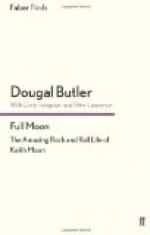From the kitchen window Thalassa watched them go: the doctor walking across the cliffs with resolute stride, the detective making for the path over the moors with bent head and slower step, as though his feet were clogged by the weight of his thoughts. Thalassa watched their dwindling forms until they disappeared, and then stood still, in a listening attitude. The sound of the lawyer stirring in the study overhead seemed to rouse him from his immobility. He closed the door, and stood looking up the staircase with the shadow of indecision on his face.
CHAPTER XXII
Upstairs Mr. Brimsdown made unavailing search among Robert Turold’s papers for proofs of his statement about his marriage. The lawyer believed that they existed, and his failure to find them brought with it a belated realization of the fact that he, too, had been cherishing hopes of Sisily’s innocence. It was the memory of her face which had inspired that secret hope. That was not sentiment (so Mr. Brimsdown thought), but the worldly wisdom of a man whose profession had trained him to read the human face. Sisily’s face, as he recalled it now, had looked sad and a little fearful that night at Paddington, but there was nothing furtive or tainted in her clear glance. He felt that a judge would look with marked attention at such a face in the dock. Judges, like lawyers, and all whose business it is to trip their kind into the gins of the law, scan faces as closely as evidence in the effort to read the stories written there.
But the disappearance of certain papers which had probably been abstracted from that room weighed more in the scale of suspicion against Sisily than her look of innocence. She stood to gain most by the suppression or destruction of the proofs of her mother’s earlier marriage. But Mr. Brimsdown could not see that this rather negative inference against the girl brought the actual solution of the mystery any nearer. It did nothing to explain, for instance, the marks on the dead man’s arm and his posthumous letter. The letter! What was the explanation of the letter? Was it not an argument of equal weight for Sisily’s innocence, suggesting the existence of some hidden avenging figure glimpsed by Robert Turold in time to give him warning of his death, but not in time to enable him to avert it?
There were other things too. What was the meaning of that sly and stealthy shake of the head which Austin Turold had given his son that afternoon. A warning obviously—but a warning for what purpose? Mr. Brimsdown could not guess, but his contemplation of the incident brought before him the image of the restless and unhappy young man, as he stood by the bedside in the next room, pointing to the marks on the dead man’s arm. Even in his vehement assertions of Sisily’s innocence Mr. Brimsdown had conceived the impression that he was keeping something back. What did Charles Turold know? Did




